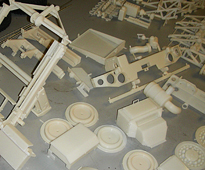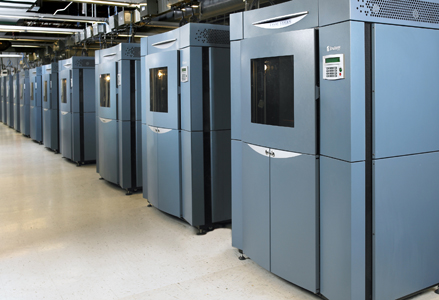|
The main practical application of 3D digital modeling in
professional model making is having parts, components
and whole models being produced by rapid prototyping
machines. As we mentioned before, it takes off model
maker's
 shoulders a hassle of time and effort combusting
manual fabrication. Rapid prototyped parts are deadly
accurate, solid, durable and can be grown or carved on a
machine in a matter of days or even hours, which speeds
up the whole model building process and allows to meet
impossible before deadlines. shoulders a hassle of time and effort combusting
manual fabrication. Rapid prototyped parts are deadly
accurate, solid, durable and can be grown or carved on a
machine in a matter of days or even hours, which speeds
up the whole model building process and allows to meet
impossible before deadlines.
Upon completion of a 3D digital model a model maker
generates a
Digital Tooling,
which is, roughly, a set of parts, grouped and
positioned in a manner that benefits the most the
outcome of a rapid prototyping production. Parts and
components that we are getting off the machine in most
cases look very similar to plastic model kits.
A massive and intensive propaganda of so called "3D
printers" lead public, including our customers, to
recognize these devices as a face of rapid prototyping, which is a wrong
assumption. Although it is a matter of terminology, in
fact every
SLA,
SLS or
FDM machine can be called "3D
printer". However, such machines are professional rapid
production systems, costly, required to be run and
maintain by professionals and producing quality, long
living parts suitable to be used in professional model
making. Such systems have little to do with portable,
mostly desktop sized, "real" 3D printers, producing
mostly small, unstable parts suitable for quick look and
simulation at best. Yet 3D printers are being massively
promoted to the architectural, engineering and design
community as an ultimate and "do it yourself" solution.
devices as a face of rapid prototyping, which is a wrong
assumption. Although it is a matter of terminology, in
fact every
SLA,
SLS or
FDM machine can be called "3D
printer". However, such machines are professional rapid
production systems, costly, required to be run and
maintain by professionals and producing quality, long
living parts suitable to be used in professional model
making. Such systems have little to do with portable,
mostly desktop sized, "real" 3D printers, producing
mostly small, unstable parts suitable for quick look and
simulation at best. Yet 3D printers are being massively
promoted to the architectural, engineering and design
community as an ultimate and "do it yourself" solution.
In reality rapid prototyping techniques, that able to
produce high quality, durable, professional parts and
components provide much greater diversity, versatility
and flexibility. Such methods are different by their
nature, material, resolution and a cost of production.
It is unwise to target all parts to be produced by the
same technique, when utilizing a diversity of methods
will give a better result and a cost saving.
While designing a digital tooling a model maker
virtually divides parts and components into groups
targeted to be produced by specific rapid prototyping
technique, where such technique will give the best
result by the most cost effective way.
Example: It would be very wrong and very costly to
produce a flat, low relief, without undercuts part by
SLA or
FDM.
CNC
carving will do the job and for a
fraction of price.
Another example: There is no reason to produce a part
with low volume of details by
SLA, especially if that
part will play a role in model's structural integrity.
The right choice to produce such model is
FDM. A little
more work to finish a part's surface will be compensated
by lower cost of
FDM and high durability of styrene
based material used by
FDM method.
In addition to earlier mentioned
SLA,
SLS,
CNC
and
FDM
methods we also anticipate another techniques, which,
for some reason, are not being considered as rapid
prototyping techniques, although, in fact, they are.
These techniques include laser cutting/engraving and
photo-etching. These two did find its rightful place in
model making process long time ago and can beat newer
rapid prototyping methods for selected parts by quality
and price as well.
As modern rapid prototyping methods are evolving, they
provide more opportunities. One of the most important
opportunities is to produce metal parts by Investment
Casting.
It is a fact, though, that rapid prototyping is still be
an expensive process. The materials and a machine's time
are costly, however use of rapid prototyping methods
does not affect an overall model's cost, while
dramatically reduces a production time and raises the
model's quality and durability.
Click on any of the icons below to learn more about each particular Rapid Prototyping
Technique. |